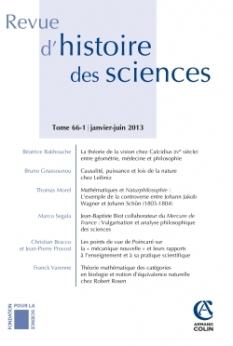
Revue d'histoire des sciences - Tome 66 (1/2013)
Pour acheter ce numéro, contactez-nous
Recevez les numéros de l'année en cours et accédez à l'intégralité des articles en ligne.
Johann Jakob Wagner (1775-1841), disciple de Schelling et important acteur de la Naturphilosophie allemande, publie en 1803 un ouvrage intitulé Von der Natur der Dinge (De la nature des choses) où il lance le projet d’une réforme de la mathématique visant à l’intégrer à la philosophie. Il provoque ainsi un débat animé dans lequel divers acteurs, scientifiques et philosophes, vont exprimer leur point de vue sur la relation entre les deux disciplines. Nous nous intéresserons en particulier à la réponse de Johann Schön (1771-1839), un mathématicien qui publie l’année suivante un livre aujourd’hui oublié dans lequel il rejette vigoureusement le projet de Wagner. L’analyse de ce débat aide, dans le contexte des réformes universitaires du début du XIXe, à comprendre l’histoire de l’émergence en Allemagne d’une discipline mathématique autonome, ainsi que l’apparition de nouvelles problématiques autour de l’axiomatisation et de la systématique.
Johann Jakob Wagner (1775-1841) was a disciple of Schelling and a leading figure of the German Naturphilosophie. He published in 1803 a book entitled Von der Natur der Dinge (Of the nature of things), in which he proposes to reform mathematics in order to incorporate it into general philosophy. This book prompted a heated debate, in which scientists as well as philosophers commented on the relations between the two disciplines. A closer look will be given to the contribution of Johann Schön (1771-1839), a mathematics teacher who wrote a book vigorously rejecting Wagner's project. The analysis of this debate, in the context of the early 19th century reforms of German universities, contributes to the understanding of the development of an independent mathematical discipline in Germany, but also the emergence of inquiries into axiomatization and systematization.